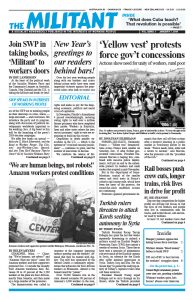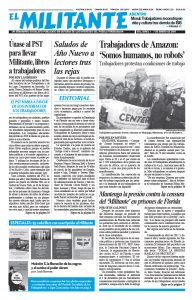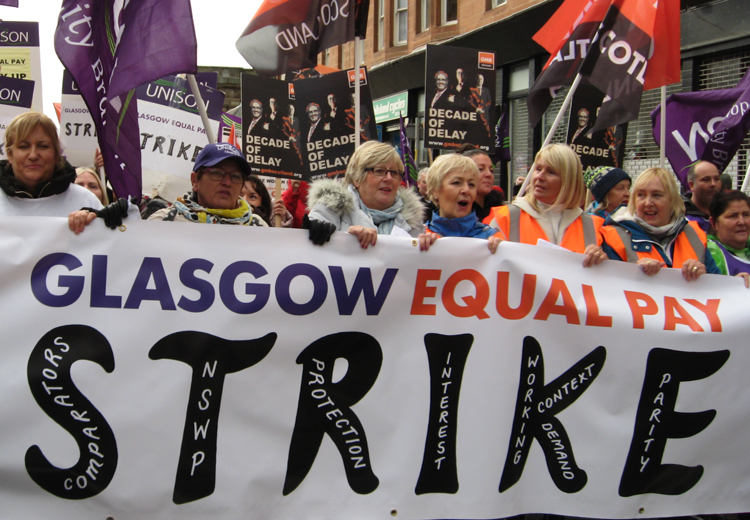MANCHESTER, England — The failed attempts by Prime Minister Theresa May’s Conservative government in the U.K. to strike a “withdrawal deal” with the European Union that can pass in the House of Commons has led to sharpening divisions and a deepening political crisis here.
Facing certain defeat, May cancelled a Dec. 11 vote on a 585-page “deal” with the remaining EU member states. That agreement would have kept the U.K. in the protectionist bloc for as long as possible, without any vote on its decisions. After she axed the vote, May then faced a “vote of confidence” by Conservative Members of Parliament, which she won by 200 votes to 117 — but only after promising that she would step down from leading the party before the 2022 general election.
May scuttled back to Brussels to ask for tweaks to the agreement, which might placate enough of her opponents to pass it, but she came back empty-handed.
May came into office following the resignation of her predecessor, David Cameron, who called a June 2016 referendum on withdrawal from the EU, hoping it would be soundly defeated. But a majority voted for the U.K. to get out, reflecting the anger of millions of workers who used the vote to protest against years of attacks on living standards, lack of jobs, seemingly endless wars and contempt by Westminster politicians and EU bureaucrats alike.
“If you’re from an ordinary working-class family,” May said, then “life is much harder than many people in Westminster realize.” While England as a whole voted to leave, as did Wales, Scotland and Northern Ireland voted to remain.
Since then, she has defied the vote, instead seeking to reach a deal with the capitalist rulers that run the EU that would combine formally withdrawing with in fact staying in. With the deal dead in the water, there is now a flurry of moves and countermoves among politicians of all parties, including warring factions within her cabinet.
Those who from the start sought to overturn the majority vote — like former Labour Prime Minister Tony Blair — have stepped up their campaign for a second referendum, demagogically dubbed a “People’s Vote.” Some members of May’s own Conservative Party are backing the proposal.
Jeremy Corbyn, leader of the Labour Party, has resisted calls within his party to back another referendum, hoping the Conservatives will take the blame for what millions would see as a slap in the face for their vote to get out. Corbyn has also rebuffed calls by smaller opposition parties to propose a parliamentary vote to bring down the government. His stance is based on hopes of cobbling together a majority of both frustrated pro-Brexit and pro-EU voters to put him in as prime minister.
What course for the working class?
“The weakness, heterogeneity, and loss of nerve and self-confidence in the British ruling class” is a consequence of the breakup of its colonial empire, disproportionate economic decline compared to its competitors, and the uneven development of the regions and countries that make up the not-so United Kingdom, Socialist Workers Party National Secretary Jack Barnes said in a 1993 talk printed in Capitalism’s World Disorder. Twenty-five years later, that assessment rings truer than ever.
Workers look on the hesitancy and infighting in the ruling class with growing disgust. When Communist League members campaign knocking on doors in working-class areas to introduce the party and discuss politics, workers say things like, “They want us to vote over and over until we vote the way they want,” or, “Oh, just get on with it, get out!” Others are concerned about the effects on their jobs and lives if warnings from the Bank of England and other ruling-class figures that there will be price rises, shortages and a recession in case of a “no-deal Brexit” — propaganda widely described here as Project Fear.
“It’s difficult to follow and I don’t think they know what they’re doing,” food factory worker Lauryna Verbickaite told this reporter and fellow Communist League member Anne Howie on her doorstep in Wythenshawe, Greater Manchester. “They said there would be more money for public services like health care, but that’s not happening.”
“Capitalist politicians try to confuse us,” I responded. “They all talk about the national interest, but they’re not talking about working people.”
“The EU is a bosses’ club,” Howie said. “Its purpose is to squeeze profits out of working people in the EU, to benefit the rulers in the stronger countries in Europe at the expense of the weaker ones, and to compete with their rivals around the world.”
“Getting completely out of the EU would put workers here in a better position to fight for our own interests,” I added, “in solidarity with fellow workers in Europe, like the yellow vests in France. Our main enemy is the capitalist rulers here at home. The answer is to chart a course to take political power out of their hands, which has to be done right here.”
EU coming apart at the seams
“It’s a profound mistake for Europe to pull the British economy out of Europe’s single market, which is the biggest commercial market in the world, and pull British politics out of the political union, which is the most powerful political union in the world,” Tony Blair had said, arguing for a second referendum. The European project, so staunchly defended by Blair, was never just about trade. The utopian aim of political integration has always been at the heart of it.
The idea of one big European state, better able to compete with Washington and other capitalist rivals, is a pipe dream. The EU is tearing apart at the seams. The capitalist powers that dominate the EU — the German rulers, and to a lesser degree the French — are not interested in making concessions to London. Their aim is to make an example of the U.K., worried that with the first breakaway, the whole thing will come unstuck.
Take Italy, with the fourth largest economy in Europe where working people have faced years of stagnation, with no recovery in sight. The government is saddled with a debt that’s 1.3 times the annual output. An “anti-establishment” coalition of the 5-Star Movement and the League came to power this year in an election reflecting the same kind of disgust with the capitalist rulers’ disdain for working people as did the get-out vote in Britain.
When the new government adopted a budget with a 2.4 percent deficit, partly to fund new welfare payments, the EU threatened Rome with sanctions. The rulers in Berlin and Paris fear that the U.K. getting out would inspire similar moves in Rome.
No matter what happens, there’s no end in sight for the capitalist crisis, and there will be more struggles like the yellow vest “people from nowhere” in France, as workers and farmers look for ways to fight for our interests.


